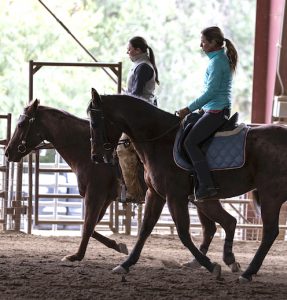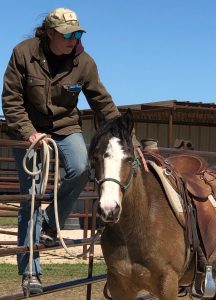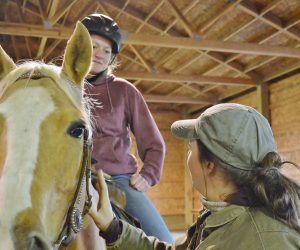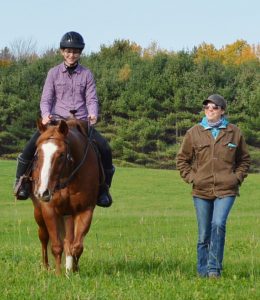
Amy Skinner and Katrin Silva at the BHPS
Editor’s Note: Amy Skinner is a regular guest columnist and has been a horse gal since age six. She will present with fellow trainer and rider, Katrin Silva, at the Best Horse Practices Summit.
Skinner rides and teaches dressage and Western. Skinner has studied at the Royal Andalusian School of Equestrian Art in Spain, with Buck Brannaman, Leslie Desmond, Brent Graef, and many others. Visit Amy’s website here.
Skinner writes:
The big names in our horse world can hold a crowd. They talk up their program and like entertaining. Making connections for them seems to come naturally. But as an introvert, being a horse trainer can be difficult. The horses are not the problem. Interactions with people are.
I don’t dislike people or dislike being around them. But I’m easily over-stimulated by too much noise, especially talking, and I feel much more comfortable alone or with one or two people. I don’t love to schmooze crowds, talk about myself, or entertain people.
 Training horses called to me because of the quiet, peaceful interactions I could have with horses. Going all day without talking to anyone while I worked and rode was and is my idea of heaven.
Training horses called to me because of the quiet, peaceful interactions I could have with horses. Going all day without talking to anyone while I worked and rode was and is my idea of heaven.
Now I know that being a pro is much more than isolated horse work. One is often approached by strangers. Client relationships are often about much more than their horses. People also need to just talk with someone, sometimes about things personal and unrelated to riding.
Initially, I was puzzled by this phenomenon of over-sharing. I encountered it frequently, and at the time, it seemed irrelevant and distracting to the task at hand.
I talked to a clinician friend of mine about it. He was older and more savvy and he understood my preference for the peace of quiet horse work and the outdoors. In his mind, folks were coming to clinics not just for horsemanship, but because they were dying for some type of connection. Being horseback made them feel vulnerable. The reasons they were struggling with their horses were the very things they were sharing with me in conversation. Their personal lives and states of mind affected how they were doing everything.

Photo by Julie Kenney
“You can’t just teach them methods,” he said. “You have to help them become better people. I know you’d rather just be around horses. But if you care about the horses, then you have to be here for the people.”
This sentence has stuck in my head. When I’m tired, over-stimulated, in an airport waiting for my next flight to get to a clinic surrounded by hundreds of people, or at social gatherings for networking and connection-building, I often think of this sentence. If I care about the horses, I need to be here for the people.
Over the past few years, I’ve worked hard to expand my comfort zones. I try to make a conscious effort to be available to people who might need help. I have role models: when I ride with Brent Graef, I see he is available to people from sun up to sundown. He’s sincere about it, and the sincerity makes folks feel comfortable enough to ask questions, try hard things, and make good changes. This is what I want for my students also. Instead of hiding in my trailer for lunch and dinner during a clinic, I’ve worked on making myself available, too.
 I’ll never be the chatty, extroverted type. I’ll never love schmoozing or small talk. In my mind, I balance expanding my comfort zones with staying genuine. My focus will always be on horses and people, but entertaining and just talking to talk isn’t part of who I am.
I’ll never be the chatty, extroverted type. I’ll never love schmoozing or small talk. In my mind, I balance expanding my comfort zones with staying genuine. My focus will always be on horses and people, but entertaining and just talking to talk isn’t part of who I am.
At a clinic this year, an older cowboy leaned over the fence and said, “Lady, you’re not like the other clinicians.”
“Oh?” I said
“The other guys tell stories. They talk a lot. At least half of the clinic is chatting and telling stories. You don’t spend a lot of time talking.”
I turned to the participants and asked, “Ladies, what do you think? Do you want me to tell some stories or do you want to ride?”
“Ride!” They all shouted unanimously.
I looked back at the cowboy and shrugged.
Amy is the real deal, I respect her more and more for her knowledge base and ability to explain it to others.
Thanks for sharing! That was really well put. The more we understand ourselves, the better we understand others. The better we can explain ourselves to others, the better we teach anything! especially horses and their people. For me, the more varied the teaching styles, the better. What matters most is the product…does the student learn and change? Does the horse learn and change?…if the answer is yes, then the clinician was successful! If the answers is no, they they are not. Every
instructor I met through Best Horse Practices Summit so far has shown talent above and beyond what I have found in the past…Big names or not. Thanks again for BHPS!